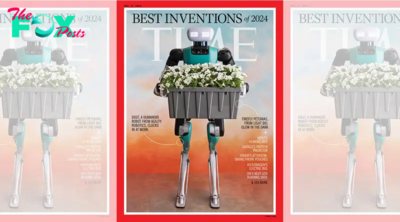Technology
How the ‘Miss AI’ Beauty Pageant, Made Up of AI-Generated Women, Is Dividing Opinion
The beauty pageant industry isn’t what it used to be. Miss Universe, which has been around since 1952, has suffered a dramatic ratings decline in the last five years. In May, the reigning Miss USA and Miss Teen USA gave back their crowns, sparking fresh controversy in the community.
Yet, a new kind of beauty pageant has emerged. This pageant is similar in many ways to the traditional experience, except for one important detail: the women are not real.
The World AI Creators Awards (WAICAS) has gathered 10 finalists in their quest to find “Miss AI,” the winner of a beauty pageant for women generated by artificial intelligence (AI). The finalists, chosen from 1,500 participants, come from teams of creators around the world. The creators utilize programs such as Open AI’s DALL·E 3, Midjourney or Stable Diffusion to generate images of the women from different text prompts.
These AI-generated women still follow stereotypical beauty standards, with thin bodies and young faces. Open AI has previously acknowledged that it finds “DALL-E 3 defaults to generating images of people that match stereotypical and conventional ideals of beauty.” Computer vision experts and the Algorithmic Justice League have also uncovered racial bias in facial analysis Technology.
In an email to TIME, the WAICAS team addressed the concerns around perpetuating traditional beauty standards, saying they want to focus on “celebrating diversity and realism.”
“This isn’t about pushing unrealistic standards, but realistic creators that represent real people,” they say. “Traditional pageantry took decades to evolve and be more representative—whilst AI can do this in fast forward which is really exciting.
These contestants will be judged based on three criteria: beauty, tech, and clout. Clout can come in a number of ways, but most of the AI-generated women are online influencers.
The World AI Creator Awards (WAICA) Instagram page features 10 posts, introducing each of the AI-generated women to audiences. One contestant, Kenza Layli, is said to be “contributing to the empowerment of women in Morocco and the Middle East,” with her almost 200,000 followers. Another, Olivia C of Portugal, is introduced as a “traveler,” showcasing how technology can “enhance the human experience, not replace it.” Meanwhile, fellow AI-generated avatar Aiyana Rainbow’s profile includes iconography of the queer community, adorned with rainbows in many posts, and is an “embodiment of inclusivity and LGBTQIA+ acceptance.”
It can be easy to forget that these women are not real, as each has a detailed personality that’s described on their Instagram page. But everything has been AI-generated, from their interests and hobbies, to the sweep of their hair and the beaches they are laying on.
The contest will be judged, in part, by two humans: Andrew Bloch, a media advisor, and Sally-Ann Fawcett, beauty pageant historian and author. They will be joined by two AI-generated influencers, Aitana Lopez and Emily Pellegrini, to judge the artistry of each meticulously-curated AI contestant.
Per the pageant’s website, the winner will receive items including a $5,000 cash prize and public relations support worth over $5,000.
The winner will be announced on Monday, July 8, via an announcement video on the World AI Creator Awards social channels.
A judge’s view on the Miss AI contest and the concept of AI-generated women
Amongst the judges, Fawcett is providing a real-world touch as an experienced beauty pageant judge in the U.K. for the past ten years.
Speaking to TIME over the phone, Fawcett admits she was originally skeptical when Fanvue—an AI-powered subscription-service designed to help creators manage and grow their online presence—approached her to judge the contest. She'd had no prior experience with artificial intelligence and was wary of the public opinion toward AI women. However, Fawcett believes AI-generated influencers are here to stay and thinks that the winner of the Miss AI pageant could help foster positive representation amongst AI influencers.
“I thought by choosing a role model, an ambassador for the AI world, who is slightly more realistic and presenting a powerful inspirational message to their thousands of followers, there could be a slight change,” Fawcett tells TIME.“Change has to start from within.”
Fawcett has witnessed first-hand how beauty pageants have changed since she fell in love with them in the 1970s, and is hoping for the same shift in AI. This is just the first iteration of AI beauty pageants, according to Fawcett.
“In the 70s, the majority of pageants were run and judged by men, and these days, I would say 95% in this country are run by women and judged by women,” Fawcett estimates. “AI is seen very much as a male preserve, and we want to try and change that stereotype.”
Fawcett says that the competition isn’t looking to reward a woman solely based on stereotypes. She emphasizes that with thousands of followers, these AI influencers and, in turn, their creators have a responsibility to share important messages.
Rather than “beauty pageant,” Fawcett thinks something closer to “a celebration of women” may be a better way to describe her hopes for pageantry. Fawcett believes that in the future, the competitions should have more diversity and even a competition including men.
“[Contestants] have created—not all of them, but most—what they think is a really, really beautiful woman. And I think perhaps they need educating as well in that it's all very well to be beautiful, but there needs to be more substance,” Fawcett says. “There needs to be somebody realistic and not this stereotype of an AI woman.”
Meet the creator behind one of the AI-generated avatars judging the contest
Sofia Novales, Project Manager at The Clueless Aigency, is one of the people responsible for creating Aitana Lopez, an AI judge for the Miss AI pageant and an iNFLuencer in her own right with over 300,000 followers on Instagram.
Aitana, one of the first AI influencers of her kind, has been given the age of 25. Her signature pink hair and detailed personality is something that Novales says the team spent two months configuring.
Aitana’s team at Clueless wanted to get involved in Fanvue’s competition to award the creativity that they helped inspire through the rise in AI-generated influencers—the art, the technology, and the originality, Novales tells TIME.
Novales comments upon a leading narrative surrounding AI-generated women—that the creators are men who are just creating their dream girl. She acknowledges that this mentality does exist in the industry, but she herself works with five other women on Aitana.
Like Fawcett, Novales is aware of the sexualization of AI-generated women and the lack of diversity in the space, and says Clueless is trying to address this within their own AI avatars.
“This is why we are creating 15 stock models of 15 women and 15 men, from totally different cultures and sizes,” Novales says. “You don't have to just create women.”
There is definitely an economic incentive to Clueless’s work with Aitana. While Novales says that the team did not make money initially with their AI creation, the virtual model can earn up to €10,000 ($10,840) a month, but the average is usually around €3,000 (3,252). Most of that comes from brand deals with clothing and jewelry companies. Just last week, Aitana was featured in New York City’s Time Square on an advertisement campaign for a hair company.
Beyond this, Novales says part of the imPetus to create Aitana was to make it cheaper for smaller brands to utilize models—rather than hiring photographers and makeup artists, creating campaigns, and flying models around the globe, now brands can use AI-generated models for a fraction of the price.
She wants to quell fears though: this does not mean that AI will make real-life models obsolete.
“We believe that they will coexist; it's just more competition in the market, a new type of service,” Novales says. “There will be agencies that will always want to be working with real people, but there will be others that want to innovate.”
What tech experts are saying about the world of AI-generated models
For Claire Leibowicz, Head of the AI and Media Integrity Program at The Partnership on AI (PAI), the Miss AI pageant represents a desire for the technical world to get everyday people used to AI-generated images with the help of something they already know they like—beautiful women.
She and her team have been prepared for the rise of generative AI and improvement in photorealism for the past few years, but were surprised by the “trendy-ness” of it, and the inclusion of iNFLuencer-culture.
Though she says she’s not thrilled with the use of a beauty pageant to get people engaging with tech, she sees it as rather innocuous to the other, more nefarious uses of generative AI such as troubling deepfakes, which are often used against women.
Beyond the context of the pageant, Leibowicz is most concerned with making sure that those who consume content by these AI-generated women know that they are not human. Undeniably, the technology is getting better, more interactive overall, and it's harder to distinguish between people and AI systems.
Read More: How Artificial Intelligence Will Forever Change How We Live
To Leibowicz, Miss AI connotes our increasingly hybrid AI-human information environment, and that even these “seemingly creative endeavors” are a part of understanding how to gauge if content is real or not. Creators need tools to make sure consumers know what they are viewing, and consumers need tools to understand.
“If [the AI women] are selling lip gloss, it might not matter. But if they're telling you how to vote, [then] one of these, you know, influencers may have a different civic value and require a different type of disclosure,” Leibowicz says. “So I think we need better transparency of who's behind these things.”
Nikhil Suresh, machine learning consultant and Director at Hermit Technology, feels more strongly against the concept of “Miss AI” and AI influencers in general. Suresh sees people flocking towards AI with a strange fascination, and tech professionals just trying to have a hand in what they see as the “future” of tech.
Suresh tells TIME he was particularly affected by a quote in a recent NPR article about Miss AI, in which one of the avatar creators “says his AI avatar is cheaper, more flexible, and doesn’t talk back.”
“I just sit here like, ‘Great. A bunch of men who have created artificial women that don't talk back,’” Suresh says, noting the “problematic” nature of such creations, including the upheld gender and racial stereotypes he saw when he looked through the top 10 contestants.
When discussing why AI iNFLuencers look as they do—generally, conventionally beautiful, thin, and with the racial bias referenced above, Suresh argues that, from his experience, these programs are simply pulling from data available to them. When a prompt is sent to these programs, the algorithm creates an answer and photo based on the masses of photos in the database, and with terms like “beautiful” in use, the results shown are what has traditionally been deemed “beautiful” and by what mass amounts of photos are available.
“So in a weird way, a lot of this bias is just a gross reflection of what was already going on in society previously,” Suresh says. “It's not like an AI problem, AI just holds up a mirror to it.”
Leibowicz agrees, stating that it’s much easier for these algorithms to churn out the people that perpetuate certain beauty standards, and that while the perception is that creators are deciding these physical attributes, many decisions are being made at the technological model level.
She asks central questions, though, about the basis of the contest: “Why is society so fixated on beautiful things?” Beyond that: “What does it mean to have this opportunity to do a beauty pageant differently? Does AI help us do that? Or does AI exacerbate the issues already present in beauty pageants?”
For Leibowicz, just as much as Miss AI raises technical questions, it raises sociological ones about not just how we as humans relate to beauty, but how we relate to technology. She remembers last year, when an AI-generated image of Pope Francis wearing a Balenciaga puffer jacket went viral online, fooling many internet users, including Leibowicz herself. Miss AI is another step in this process of the human and AI enmeshing with one another, particularly on social media. To what extent it will go, she’s not entirely sure.
“On the one hand, let this be the only use for interactive and emotionally appealing AI; I'm happy it's being used for pageantry and not to manipulate people,” Leibowicz says. “And at the same time, why perpetuate these existing parts of society that maybe bring out things we might want to move away from to a more equal and just society?”
-

 Technology1h ago
Technology1h agoBreaking up Google? What a Chrome sell-off could mean for the digital world | The Express Tribune
-

 Technology16h ago
Technology16h agoAI harm is often behind the scenes and builds over time – a legal scholar explains how the law can adapt to respond
-

 Technology17h ago
Technology17h agoNewborn planet found orbiting young star, defying planet formation timeline | The Express Tribune
-

 Technology21h ago
Technology21h agoAwkwardness can hit in any social situation – here are a philosopher’s 5 strategies to navigate it with grace
-

 Technology21h ago
Technology21h agoNo need to overload your cranberry sauce with sugar this holiday season − a food scientist explains how to cook with fewer added sweeteners
-

 Technology1d ago
Technology1d agoTeslas are deadliest road vehicles despite safety features: study | The Express Tribune
-

 Technology1d ago
Technology1d agoUS pushes to break up Google, calls for Chrome sell-off in major antitrust move | The Express Tribune
-

 Technology2d ago
Technology2d agoPublic health surveillance, from social media to sewage, spots disease outbreaks early to stop them fast



























